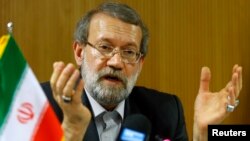GENEVA —
A senior Iranian official calls next week’s negotiations between Iran and six world powers "a window of opportunity." Former nuclear negotiator Ali Larijani, now the speaker of Iran's parliament, says differences over his country's nuclear program with the West can be resolved.
Larijani expects the upcoming talks with world powers in Geneva over Iran's controversial nuclear program to be serious. He said his government has devised plans, which it will propose.
Larijani added that he views next week’s negotiations positively, because countries that have been applying sanctions on Iran and leveling threats against his country are opting for a political solution.
“As I see it, this change, if I can use the word, in itself is positive," he said, "I will further explain by saying that if the collective will at work here, if it takes up a political solution over others then finding a resolution to the whole problem would not be that difficult a task.”
The West fears Iran is building a nuclear weapons program, Iran says it only has peaceful aims.
Iran and six world powers have been trying to reach a deal since 2006. The latest talks, held in April in Kazakhstan ended in deadlock as did previous rounds.
Since then, the tone between Washington and Tehran has softened. U.S. President Barack Obama recently held a short phone conversation with Iran's newly-elected President Hassan Rouhani, the first direct contact between the two countries' top leadership in more than three decades.
The contact capped a week of outreach to the West by Rouhani and Iranian Foreign Minister Javad Zarif during the annual opening session of the U.N. General Assembly.
Representatives from the so-called P5 plus one group, which include Britain, China, France, Russia, and the United States plus Germany, will aim to get Iran to rein in its nuclear program when they meet in Geneva on October 15 and 16.
The last proposal in Almaty called on Iran to halt 20 percent enrichment activities and to transfer part of its stockpile of enriched uranium to a third country under the supervision of the International Atomic Energy Agency.
Iranian Foreign Minister Zarif said recently that the offer was no longer valid, and that the P5+1 should come to next week's negotiations with a "new point of view."
Larijani said his country has resisted giving in to the West despite economic sanctions and the threat of the use of force and has enhanced its nuclear capability.
“I will further explain by saying that those countries who used to think that by applying pressure and leveling sanctions they will be able to force Iran to change its position, have rather come to realize that despite all of these impediments, Iran has persisted and today has a more advanced access to peaceful nuclear technology,” he said.
Tehran wants the United Nations and Western countries to lift the sanctions. But the U.S. has said sanctions will remain in place during the talks.
Larijani expects the upcoming talks with world powers in Geneva over Iran's controversial nuclear program to be serious. He said his government has devised plans, which it will propose.
Larijani added that he views next week’s negotiations positively, because countries that have been applying sanctions on Iran and leveling threats against his country are opting for a political solution.
“As I see it, this change, if I can use the word, in itself is positive," he said, "I will further explain by saying that if the collective will at work here, if it takes up a political solution over others then finding a resolution to the whole problem would not be that difficult a task.”
The West fears Iran is building a nuclear weapons program, Iran says it only has peaceful aims.
Iran and six world powers have been trying to reach a deal since 2006. The latest talks, held in April in Kazakhstan ended in deadlock as did previous rounds.
Since then, the tone between Washington and Tehran has softened. U.S. President Barack Obama recently held a short phone conversation with Iran's newly-elected President Hassan Rouhani, the first direct contact between the two countries' top leadership in more than three decades.
The contact capped a week of outreach to the West by Rouhani and Iranian Foreign Minister Javad Zarif during the annual opening session of the U.N. General Assembly.
Representatives from the so-called P5 plus one group, which include Britain, China, France, Russia, and the United States plus Germany, will aim to get Iran to rein in its nuclear program when they meet in Geneva on October 15 and 16.
The last proposal in Almaty called on Iran to halt 20 percent enrichment activities and to transfer part of its stockpile of enriched uranium to a third country under the supervision of the International Atomic Energy Agency.
Iranian Foreign Minister Zarif said recently that the offer was no longer valid, and that the P5+1 should come to next week's negotiations with a "new point of view."
Larijani said his country has resisted giving in to the West despite economic sanctions and the threat of the use of force and has enhanced its nuclear capability.
“I will further explain by saying that those countries who used to think that by applying pressure and leveling sanctions they will be able to force Iran to change its position, have rather come to realize that despite all of these impediments, Iran has persisted and today has a more advanced access to peaceful nuclear technology,” he said.
Tehran wants the United Nations and Western countries to lift the sanctions. But the U.S. has said sanctions will remain in place during the talks.










